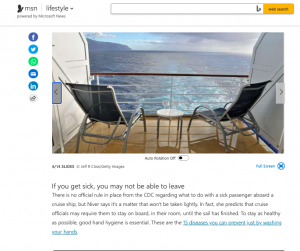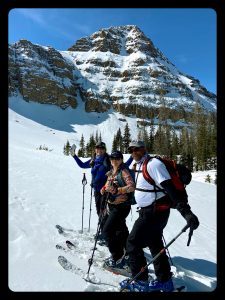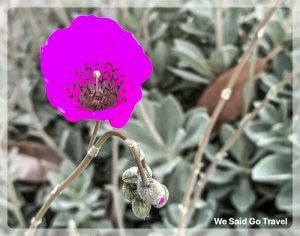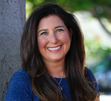Lisa Niver's Blog: We Said Go Travel, page 95
June 19, 2020
{{unknown}}
The post appeared first on We Said Go Travel.
Anti-Racism with Rabbi Ron Stern

[image error]
Over the past week, Rabbi Ron Stern from Stephen Wise Temple shared his personal journey into a deeper understanding of the complexities of race in America. I found it so inspiring, I asked for permission to share all 5 days again here.
My grandmother had a maid’s bathroom.
I was born in the Jim Crow South. I didn’t know it at the time, of course. We belonged to the country club where we’d go to swim, waited on by Black attendants dressed in immaculate white uniforms. There wasn’t a Black face in the water, nor seated on a lounge chair. It was just the way it was. In my grandmother’s house there was a special bathroom where white uniforms were hung on gray cinderblock walls. It was undecorated, just off the rather large laundry room, and from time to time I’d venture in because it was closest to the kitchen. What I didn’t know then, and only found out after reading The Help was that this was the maid’s bathroom, built by the original owners in keeping with southern custom so that the Black maids wouldn’t use the bathrooms anywhere else in the house. I also didn’t know that those uniforms were a vestige of a time when they were required attire for a Black nanny when she took her white charge out for a walk. Failure to wear the uniform could result in accusations of abduction or at the very least harassment by the all-white police force.
What astounds me is that I realized none of this until I was well into my 40’s. It was then that I began my journey into understanding the enduring and systemic racism that is still tragically pervasive in this country. As a white Jew in the south, and even growing up in the more “enlightened” north (or so I thought), the circumstances of Black America just weren’t on my radar.
While the uniforms are gone and there is more integration at the country clubs, plenty of older houses still have that bathroom, of course. Charlotte, North Carolina is a far more integrated and enlightened city than it was when I lived there but old habits die hard. Despite the disappearance of the most obvious signs of discrimination and the meaningful progress, profound and discriminatory racial biases continue all these years later.
Educate yourself. Take the time to listen to the Code Switch Podcast.
Looking to have the conversation with your kids? Please do! Look here.
I was thrown against the wall…
Ten years ago I attended a gathering of clergy associated with the PICO National Network (info here). We went to New Orleans five years after hurricane Katrina revealed some of the deepest racial disparities in the local and national response to the devastating event. There, with clergy from across the country, a significant percentage of them Black, I was first exposed to the idea of systemic racism. As the legal scholar and civil rights attorney Michelle Alexander spoke about the premise of her book, The New Jim Crow, I was thrown against the wall by the power of her message and its deeply disturbing content.
“Jim Crow” is a term that describes the cultural, economic, and geographic unintended policies and systemic behaviors that result in racial inequality. Alexander uses the term to characterize our current justice system (prisons, courts, police) that ultimately results in huge inequities in the way Blacks and whites are treated—disparities that cannot be accounted for by crime rates in communities of color. For the most part it is the result of a “war on drugs” that puts minor offenders behind bars. By criminalizing drug use rather than considering it a medical condition, we’ve reached a time where Black men make up one third of the prison population though they are only 12% of the general population. Contrary to popular belief they do not commit offenses in greater proportion to whites.
As one of only a handful of rabbis in the room, we felt the burden of our whiteness and our Jewishness. After all, we were the ones who marched with Martin Luther King. We are proud of our past in the civil rights movement! To learn that our system continues to discriminate in ways that were outlined by Alexander in her speech and further clarified in her book was devastating. How could this great country and its storied justice system be so unjust for people of color?
Hear Michelle Alexander speak about the New Jim Crow.
“An articulate Black woman.”
LA Voice is the affiliate of the PICO National Network. Founded by Catholic theologian John Baumann as the Pacific Institute for Community Organization (now called People In Communities Organizing) in Oakland in 1972, the organization has a heavy Black and Catholic presence. My involvement with PICO has put me in touch with some incredible activists and thought leaders around areas of poverty and race. To say that my eyes have been opened is an understatement—I feel like I was once truly blind. I am grateful for the gentle (and sometimes necessarily disturbing) lessons taught to me by its leadership.
At a gathering in Los Angeles, we were challenged to explore our own racial biases. “Me, racially biased!?” I thought. No way! I’m totally aware! Just then a Black woman rose to speak about her experiences with racial bias. I thought, “she’s so articulate.” And then she asked the provocative question: “When a white woman rises to speak, how often do you say she’s an articulate white woman?” Uh-oh…how did she know what I was thinking?
Here’s the lesson. I thought that I’d devoted a great deal of time to making myself aware of my internal biases. From my encounters with Black churches after the LA riots in 1992, to my work with PICO, to the books I’ve read—I believed I had it figured out. Until this insightful woman asked me to plumb deeper into my own proclivities. And it was then that I discovered, it is always a work in progress.
Here’s a good place to start learning about implicit bias. Or just Google it!
What I tell my son.
Shortly after my son learned to drive, he was pulled over by a cop after completing what was described as a “reckless turn” on his ticket. I was glad! It put him in his place and provided a learning opportunity. We took public transportation to the juvenile traffic court office in South LA. It took hours! I wanted him to experience the obvious result of losing one’s license. Mom and dad would not be his taxi service (this was long before Uber).
I’ve never had “the talk” with my son, I never felt I had to. But millions of Black parents believe they must have “the talk.” It’s not about sex, it’s about what they must do when pulled over by the police. Put your hands on the wheel, do nothing suspicious, ask before you do anything, never reach quickly for your wallet, phone, or into the glove compartment. Never, ever resist anything the officer tells you to do and so on…
Black parents know that all too often non-aggressive actions are interpreted as life threatening actions by arresting officers. Philando Castile’s death as he reached for his gun permit (after telling the officer what he was doing) is the most infamous example.
The truth is that most Ashkenazi or Sephardic Jews don’t know what it is to go through life as Black (unless, of course we are both Black and Jewish). So it’s easy to forget that once all Jews were Black by association. Country clubs, neighborhoods, and schools all prohibited Jews and Blacks. But after the Shoah, white America reclassified some Jews – upon seeing so many people who looked just like them in newsreels of the camps, World War II turned some of us white.
As I walked amidst the protestors in Pan Pacific Park last weekend and saw the predominantly white faces in the crowd of thousands (and the many Jewish stars on the signs), I was heartened to know that so many of our young people are doing their best to understand what it is to be Black in America.
Here’s an important podcast with episodes exploring race and poverty.
A new reading list.
My daughter is on the front lines of racial equality. She works at Vista del Mar—once a Jewish orphanage, it now serves at-risk children of all ethnicities. (You can support their work here.) As a clinical social worker she provides counseling to mostly children of color who are some of the most traumatized by their birth circumstances and usually victims of drug abuse, sex-trafficking, and violence. These kids have fallen through the cracks. Her level of awareness far exceeds mine. So, when she says to read something, I do it.
Some time ago, she recommended Ta-Nehisi Coates’ book Between the World and Me. Each turn of the page brought me face to face with what it means to be Black in America today. It’s a poignant letter to his son, that is, quite frankly, required reading for all of us trying to understand our present circumstances. He asserts that to grow up as a Black man today is to fear “friskings, detainings, beatings and humiliations” from those who “have been endowed with the authority to destroy your body.” He lays bare the myth of the American dream that for most Black people is not only unattainable but is held out of reach by a society that places overwhelming obstacles before them.
This is not an easy read. It is painful and it is disheartening—but it is the story that Black Americans read and understand. It is their life.
The most important thing we can do is to educate ourselves. To reach an awareness we didn’t have before George Floyd’s brutal murder opened our eyes. We could shelter ourselves behind a fortress of denials and refutations by those who can’t countenance the disruption of our comfortable world view. I just hope we don’t.
Learn more about anti-racism and find resources here.
Today is Juneteenth, a holiday that celebrates the ending of slavery in the United States. Learn more here .
The post Anti-Racism with Rabbi Ron Stern appeared first on We Said Go Travel.
The post appeared first on We Said Go Travel.
The post appeared first on We Said Go Travel.
June 18, 2020
MSN: 13 Ways Cruises Could Change Forever After Coronavirus

Thank you to MSN, Lindsay Tigar and Reader’s Digest for including me in “13 Ways Cruises Could Change Forever After Coronavirus!”
[image error]
Boarding will become much more complicated
Travel expert Lisa Niver has spent plenty of time aboard cruise ships. Not only is she a former senior assistant cruise director for Renaissance Cruises, but she also worked as a youth activities manager for Princess Cruises and a loyalty ambassador for Royal Caribbean. As we all start to think about the “new normal” of vacations, Niver predicts that boarding a cruise will be a tad more complicated. For starters, the new process will likely include a health questionnaire similar to those previously used for SARS, MERS, and norovirus. Cruise lines will also do their best to make sure you’re healthy before you step on board. “[They] will take people’s temperature before boarding, as many airlines are doing,” she predicts. “They may also use swabs or blood tests like the airlines.” Here’s how else flying could change after coronavirus.
[image error]
If you get sick, you may not be able to leave
There is no official rule in place from the CDC regarding what to do with a sick passenger aboard a cruise ship, but Niver says it’s a matter that won’t be taken lightly. In fact, she predicts that cruise officials may require them to stay on board, in their room, until the sail has finished. To stay as healthy as possible, good hand hygiene is essential. These are the 15 diseases you can prevent just by washing your hands.
[image error]
Some cruises may invest in onboard clinics
Many cruise ships already have onboard health clinics. However, they are usually small and meant for minor injuries and the rare emergency. As we look ahead, though, many cruises could expand these services to include more doctors and, potentially, quarantine areas, according to Niver. Having a designated area where vacationers can report to can provide peace of mind to all travelers. It also makes it much easier to contain and treat the potential spread of COVID-19 and other illnesses.
[image error]
You may have to carry an immunity passport
If you’ve ever traveled to parts of Central or South America, you likely got a yellow fever vaccination to protect you against this mosquito-borne illness. After you get your shot from a doctor or a clinic, you’re given a “yellow card” for your passport that proves you are protected and able to board a plane to the destination in question. This is also true if you’re on a cruise ship that includes excursions to land in these countries. Within the next two years, Niver expects the same will happen with the COVID-19 vaccination, once there is one widely available for the public. Cruise ships (and airlines, for that matter), may begin to require this immunization for passengers.
[image error]
Buffets may be a thing of the past
Talk to anyone who’s been on a cruise and they’ll rave about the unlimited access to the overflowing, delicious buffets that are available nearly 24/7. Carving stations, omelets made-to-order, and all the desserts you can imagine are part of the fun of the experience. Sadly, Niver says it may be a thing of the past since it’s hard to control germs in this type of setting. Ordering off of a menu or placing your order via an app may be the new standard. In fact, some cruise lines, like Royal Caribbean, are already removing their buffets, at least temporarily.
If buffets do stick around, it’ll look different than before. “Perhaps there will still be a buffet, but each part will have a server so that there is no contamination of the food,” Niver says. “[Or] it will be individual servings at the buffet—more like a grab-and-go at a coffee shop.”
[image error]
“Knock and drop” will be more common
Already, Niver says hotels are doing contactless room service called “Knock and Drop.” As you can guess from the nickname, this is when you order food to your room, the hotel staff brings it, knocks at the door, and skedaddles. Niver says that those same tactics will likely be used on cruise ships, too. Though part of the luxury of staying away from your home is being waited on night and day, the pandemic may require a different type of distant hospitality. While we’re on the topic, these are the 10 things you probably won’t see in hotels anymore.
[image error]
They will sail at 60 percent capacity
Many cruise lines are already announcing limited capacity when they do start sailing again. Niver predicts it will be around 60 percent or less across the board. If you read the CDC’s lengthy recommendations, it could easily be 50 percent if ships comply. And some passengers may be prohibited from booking a trip. Royal Caribbean recently announced that people over the age of 70 would not be allowed to buy a ticket unless they had a doctor’s note saying they were fit to travel and did not have “a severe, chronic medical condition.” This policy doesn’t look like it will change anytime soon.
[image error]
More travelers will opt for family-sized suites
Whomever you board the ship with is part of your party, and therefore, you can be closer than six feet away from them. Thus, Niver predicts that couples, families, and friend groups will be more likely to opt for a family-sized suite to accommodate larger parties—and to have the ability to enjoy a private balcony without worrying about infection. Plus, your cabin will likely be one of the few places you won’t be required to wear a mask, so folks may spend more time inside than usual. By the way, these are the 6 times you have to wear a face mask—and the 3 times you don’t.
[image error]
The post MSN: 13 Ways Cruises Could Change Forever After Coronavirus appeared first on We Said Go Travel.
June 15, 2020
During #COVID19 Quarantine & Curfew, Are You Searching for Pretty Good Advice?

I read Pretty Good Advice: For People Who Dream Big and Work Harder by Leslie Blodgett during quarantine for Covid-19. I wanted to share some of her tips in case you need advice during this uncertain and unpredictable time.
[image error]
Risk makes you afraid. You don’t get to choose whether or not to be afraid. Only whether to dive in, despite your fear. If you wait for the fear to go away, the opportunity will go away too. I wanted the opportunity.
If you’re not already catching on, the secret is: I choose to be lucky. This is the best trick you can play on yourself. It’s like magic. I’ve been saying I am lucky for so many decades now that my luck has taken on an almost mystical quality.
Step #1 (there is only one step): Tell yourself and others you are a lucky person. Do that and you will become one.
[image error]
I got the message loud and clear. I learned how to put my own spin on things. You have to actively fight the urge to be the same as everybody else. Use your feet to lead, not follow.
Play around, learn what works, practice. This goes for any age or ability—and not just for makeup. Experiments are good. This stuff washes off.
[image error]
We all have fears, foibles, weaknesses. They are what connect us: All of us are flawed.
Bloom Your Own Way 52. Imagine being a bush, or a stalk, at the first spring bloom. And instead of petals, you have pods that look like caterpillars. Kids think you are an animal, not a plant. You look strange, but you feel familiar and warm, because you are furry and fuzzy. People touch you, even though you are twiggy. You are cozy, mysterious, curious, and bare. It is perfectly natural to be both humble and bold. The pussy willow has an edge. Defy assumptions.
[image error]
Because magic is happening all the time, all around us. And if you make a point of looking out for Magic Moments—and remembering them—you will always have something to celebrate.
Competition is one of the most powerful drivers, but sometimes you may need to chart a different course. Sail your own race.
[image error]
You might think this sounds morbid, but reading obituaries makes you think about what people will remember about you. You wonder: Who were these people? What was their story? What are people going to say about ME when I’m gone? Oh, wow. Maybe that’s something I could actually work on NOW? How do you want people to remember you?
My rule is: There are no rules. Especially when it comes to how you want to present yourself to the world. No one should tell you what to do with your own body.
[image error]
I found there’s beauty in contradiction. You are allowed to change your mind. Or have radically different answers for different situations. That’s not crazy. That’s human.
[image error]
All flower photos by Lisa Niver with #LGV60ThinQ
during COVID-19 walks around the block.
The post During #COVID19 Quarantine & Curfew, Are You Searching for Pretty Good Advice? appeared first on We Said Go Travel.
June 13, 2020
It’s her time to shine! West Coast, the series premiere ...
It’s her time to shine! West Coast, the series premiere of #DCStargirl starts NOW on The CW! pic.twitter.com/5NdY0okr8e
— DC's Stargirl (@stargirl_cw) May 20, 2020
The post appeared first on We Said Go Travel.
June 11, 2020
Want to Ski in God’s Armchair? Inspired Summit Adventures

My University of Pennsylvania college friends and I decided to have a new ski adventure in March 2020. We often meet to go skiing and always have an amazing reunion. This year we chose to have an advanced private ski lesson at Park City Mountain and try a backcountry experience.
[image error]Heather, Carl and Lisa skiing in Feb 2018
My friend, Patricia Stokes from National Ability Center, recommended Shaun Raskin, owner and lead guide at Inspired Summit Adventures. I believed that our snowmobile experience would be like CAT skiing but private for just us even though I have not yet been CAT skiing. I had no idea how giant of an adventure I had signed us up for!
We went to White Pine Touring the night before to get our skis, boots and poles. We needed special alpine touring (AT) equipment which allows flexibility for hiking uphill but stability like a traditional downhill ski book when you are skiing. The boots have a lever for the “walk” feature. Carl was able to use his new ski boots which have this feature built in already.
Our rental skis had AT bindings that have a pivoting device so your heels off raise up off the skis with each step but your front or toe of your boot is locked in place. You can SLIDE up the snow with your skins on the bottom of your skis which look like you are attached carpet to them. The long strips give you traction and have a strong, reusable adhesive on one side which you stick to the skis’ bases. The mohair or synthetic fur on one side flattens as you move uphill, and your skis should glide over the snow, but keep you from sliding back.
[image error]Carl, Heather and Lisa and our snowmobiles! Photo by Shaun Raskin
At the top of your climb, you clamp the binding done so the heel is back on the ski and ski downhill as you would on a pair of traditional downhill bindings. The poles are adjustable so that you could change heights for our hike and skiing.
After we signed up and while we were gearing up, Carl and Heather kept saying, “We’re doing to die.” They were joking but I was starting to believe it.
[image error]Carl, Heather and Lisa in the Backcountry! Photo by Shaun Raskin
Shaun picked us up in Park City at our condo and helped us make sure we had the right gear. She brought us backpacks that we could store our layers in and had our avalanche gear including a shovel, a beacon, and an avalanche probe. We would be wearing transmitters and my terror level continued to rise as all of this was explained to us. We had brought picnic food and water but I was wondering if I would ever be hungry again through my fears. I had never taken avalanche class but we had a top guide and crossed my fingers we would survive.
During the stunning drive to Kamas, we saw the incredible mountain range in front of us. We stopped at Mirror Lake Station which is a gas station for the most famous donuts in Utah. They won Utah’s Best Donut Award during the Utah Dough Show, a convention for donut-lovers. The station’s raspberry fritter beat out doughnuts from 22 other bakeries from around the state.
[image error]Heather skiing! GO HEATHER GO! Photo by Shaun Raskin
We arrived at the end of the Mirror Lake Highway in the Uinta-Wasatatch-Cache National Forest at the Western slopes of the Uinta Mountains! We put on our ski clothes, packed our backpacks and our next part of the adventure was a 45-minute snowmobile ride 15 miles East to the North facing col of Bald Mountain.
We had two snowmobiles for the four of us. I had never been on a snowmobile ever before in my life. Carl suggested that I drive. I countered that since he rides a motorcycle, he would be a better driver than me. Shaun said anyone can drive a snowmobile and Carl said why don’t you try.
[image error]Lisa, Carl and Heather having lunch at Reid’s Peak AKA God’s Armchair
Photo and Lunch bench by Shaun Raskin
I thought, “Are you sure this is a good idea?” But everyone was supportive and I was able to drive. It felt like I almost turned our snowmobile over on its side but Carl said, “Don’t worry! You’re doing great.” We looked at a couple different spots to go ski touring but Shawn led us to Bald mountain.
We put on our skis and skins and we trekked for about an hour over fresh powder through the trees and up towards where we were going to go skiing!
At one point at a total meltdown. Shaun was very concerned and asked me, “Are you physically hurt?” I shook my head no and said, “I’m not hurt physically.” She said, “You’re here with friends. Just let it out, go ahead and cry. I said, “I’m just afraid I can’t do it.”
[image error]Carl, Heather and Lisa: WE CAN DO IT!
Photo by Shaun Raskin
Shaan said,” Let’s talk about the difference between perceived reality and actual reality. In actual reality, I know you can do it because you already are doing it. I am an extremely experienced guide with over fifteen years experience and I am assessing you at all times to make sure you are up to the challenges. I can tell you that you are. Second of all, if there comes a time when it is too much for you, I can simply go get the snowmobile and pick you up. So an actual reality, you can do it because you are doing it.”
With her support and my friends for the past 30 years, I kept trekking with my alpine ski touring gear and we made it to God’s armchair.
[image error]
It was really pristine and stunning and as Heather said it was truly awesome. We each had to turn to ski down the slope. I will never forget the fresh powder and knowing that I could conquer the terrain and my fears. As my ski run started to end, I screamed over and over again, “I did it! I did it! I did it!”
Shaun made us a picnic bench out of our skis and we devoured our lunch. Suddenly the sun was getting lower and it was time to go. As we skied back to the snowmobiles and then rode the snowmobiles back to the van, I knew that this was one adventure none of us would ever forget. I highly recommend it but know that you are up for some serious physical activity and for me emotionally too. I can’t wait to go again!
[image error]
The post Want to Ski in God’s Armchair? Inspired Summit Adventures appeared first on We Said Go Travel.
June 8, 2020
Finding Ourselves with Chika, Curfew and COVID-19

During COVID-19 quarantine, I have been reading many books especially my favorite authors like Mitch Albom. I have enjoyed all of his books especially Tuesdays with Morrie: An Old Man, a Young Man, and Life’s Greatest Lesson, The Five People You Meet in Heaven and The Next Person You Meet in Heaven: The Sequel to The Five People You Meet in Heaven.
Finding Chika: A Little Girl, an Earthquake, and the Making of a Family came out at the end of 2019 but I made time to read it during quarantine.
This story is about Chika Jeune who was born in 2010 just prior to the devastating earthquake in Haiti. As a three year old, she was brought to the Have Faith Haiti Orphanage that Mitch Albom and his wife, Janine opened and where they have helped many children. When she was five, it was discovered that she had a serious illness and needed treatment that could not be provided in Haiti.
Her disease did take her life within two years but Chika’s love, humor and personality shine through the pages of this book and Mitch Albom’s heart. What does it mean to be a family? Who do you fight for? What gives your life meaning?
Especially during this time of COVID-19, quarantine, curfews across many cities in America and senseless violence which has brought out the National Guard for assistance, I wanted to share these quotes below that inspired me from the book, Finding Chika.
[image error]
To this day, it pains me. There are many kinds of selfishness in this world, but the most selfish is hoarding time, because none of us know how much we have, and it is an affront to God to assume there will be more.
[image error]
“Dying is only one thing to be sad about, Mitch. Living unhappily is something else”
[image error]
The most precious thing you can give someone is your time, Chika, because you can never get it back.
[image error]
But none of us are assured of tomorrow. It’s what we do with today that makes an impact.
[image error]
Chika filled every day. She drank it in. She lived it up. And always, always, she affected someone, most often by making them smile.
[image error]
Families are like pieces of art, they can be made from many materials.
[image error]
All flower photos by Lisa Niver with #LGV60ThinQ
during COVID-19 walks around the block.
The post Finding Ourselves with Chika, Curfew and COVID-19 appeared first on We Said Go Travel.
June 4, 2020
Candid #COVID19 Convo with Celia Werner & Lisa Niver about #TRAVEL

Have you ever wondered how to be a travel writer? Videographer? News Corespondent? Come visit Lisa and Celia today to hear about her journey creating We Said Go Travel and how she has reached over 1 million views on YouTube while traveling the world. Bring your questions, this is going to be a good one! LISTEN ON SOUNDCLOUD
[image error]
Watch on Facebook Live
[image error]
[image error]
Listen on Apple Podcast
[image error]
[image error]
Listen on Spotify
[image error]
“We Said Go Travel” With Lisa Niver
Candid Convo’s with Celia Werner Episode 42
Want to Connect with Lisa?
wesaidgotravel.com/category/we-said/
lisaniver.com/one-page/
instagram.com/wesaidgotravel/
facebook.com/wesaidgotravel/
youtube.com/user/WeSaidGoTravel
Follow Celia:
Website
Twitter
LinkedIn
Celia and I met through XOMAD.
Read about her on The Plug:
Quarantine Tips Through the Lens of a Videographer
[image error]
and Lisa’s interview on The Plug:
Building a Creative Travel Blogging Business
[image error]
The post Candid #COVID19 Convo with Celia Werner & Lisa Niver about #TRAVEL appeared first on We Said Go Travel.
June 3, 2020
{{unknown}}
The post appeared first on We Said Go Travel.
We Said Go Travel
We Said Go Travel is a global community of over sixteen hundred writers with articles from every continent.
Stories are shared with photos and video from a perspective of the transformative power of travel. We Said Go Travel has hosted live and online events as well as travel writing contests around the world. ...more
- Lisa Niver's profile
- 57 followers



